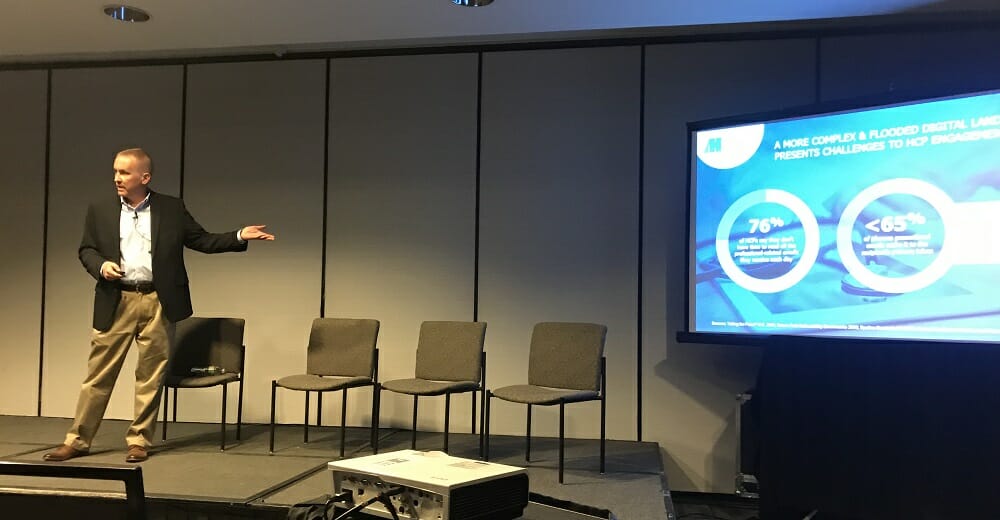
Aptus Health is leveraging artificial intelligence to provide its clients with a deeper understanding of how HCPs consume data to better equip them to reach, engage with and influence this critical cohort.

Tom Wassel, Aptus Health’s director of analytics, focused on how advanced analytics can be applied to engagement programs during the final session at the recent ePharma conference in New York. In his presentation, Machine Learning for Real-World Engagement, Wassel noted that competition for mindshare in the HCP space is fierce. More than 65% of pharma promotions sent to providers are never seen, making it increasingly challenging for companies to rise above the noise of what has become a crowded and complex digital landscape.
Turning to the audience, he asked them to speculate as to why the more traditional approaches to promotion don’t work. Participants postulated that, “You’re not catching them at the right time,” or “There’s no relationship between you and the client.”
“Exactly,” Wassel responded. “Then why are we still using a cold-call mentality where the probability of engagement is incredibly low when it comes to digital strategy?”
Wassel described the wide array of digital tools that Aptus offers to help clients break through with personally relevant, timely and valuable content. These include Univadis, a global online education and news forum for HCPs; Tomorrow Networks, a mobile advertising platform with a geo-dome application for consumer and HCP audiences; and EngagedMedia, an intelligent mobile messaging solution that offers personalized prescription and adherence support to enrolled patients.
Based on the millions of interactions HCPs have had on the company’s Univadis platform, Aptus Health is helping its pharma clients cultivate “an ecosystem interaction,” focused on increasing the interest level and probability of engagement within the client’s community of HCPs, he explained.
“The ecosystem interaction tells us a tremendous amount about what’s happening,” Wassel noted. “It is vital to meet your customers where they are in order to get past the barriers of ‘Do I click or do I move on? Do I open this email or delete it?’ We have to make sure that we are aligning the content we’re sending with the HCP’s interests.”
To reach and engage HCPs with the goal of ensuring clients a better response to campaigns, Aptus Health implements a three-pronged strategy: capturing observational big data, leveraging insights from its predictive analytics model and generating smart digital solutions that integrate all of the above.
“If you’re structuring the data correctly, you end up capturing the insights that really matter,” Wassel explained. “Then once you have that data collected, you have to think about how you can leverage it. We are observational and organic in our data collection, and we always make sure that we’re asking the right questions before we push anything out to the HCP.”
Aptus Health has identified three central elements of HCP interest: topic preference, format preference and channel preference (i.e. onsite email or the Univadis platform).
While topic preferences can be tough to nail down, they offer brands a way to extend their messages to relevant and receptive audiences. “Just because an HCP is a cardiologist doesn’t mean they never want to receive content on other disease states such as diabetes, etc.,” Wassel said.
For example, by using predictive analytics to identify HCPs with a predicted preference for women’s health content on Univadis, Aptus was able to expand the scope of their client’s target audience and engage these HCPs in branded content by as much as 2.5 times over benchmarks. Wassel noted a doctor’s “preferences are going to change over time as their practice and patient population shifts,” underscoring the importance of monitoring behaviors over time and adjusting engagement programs based on the resulting insights.
When it comes to format preference, Wassel noted “one size does not fit all.”
“You can’t just take one piece of content and send it out to everyone thinking you’ll get a similar response,” he continued. “One doctor might prefer a very short piece of content, while another prefers a daily quiz — it’s all about understanding how to give them the content they’re interested in, in the most convenient form possible.”
Wassel said that while these methods are highly effective, there is no “silver bullet” for reaching the right audience. Yet interest-focused campaigns leveraging these kinds of insights lead to greater results — including a median Rx lift of 3.8% across dozens of Aptus Health campaigns and an average 3.7-to-1 ROI.
“These tools we provide are all about helping clients gain insights about behaviors, so that if a doctor sits down at his or her computer and is considering pressing the ‘Delete all’ button, you have offered something they are likely to engage with,” Wassel said. “Once we help you figure out what that is, then we can really hone in on how to shape your journey marketing strategy.”
This ability to optimize campaigns based on audience insights delivers a better user experience. For example, Aptus Health can recommend adjustments to a brand’s content strategy based on therapeutic area, demographics, practice type and marketing personas — in addition to message and channel delivery recommendations based on an individual HCP’s format, topic and channel preferences.
Said Wassel, “It’s all about following these HCPs into their ecosystem and making your outreach as natural and organic as possible. That’s when you’ll not only reach them, but engage them as well.”






